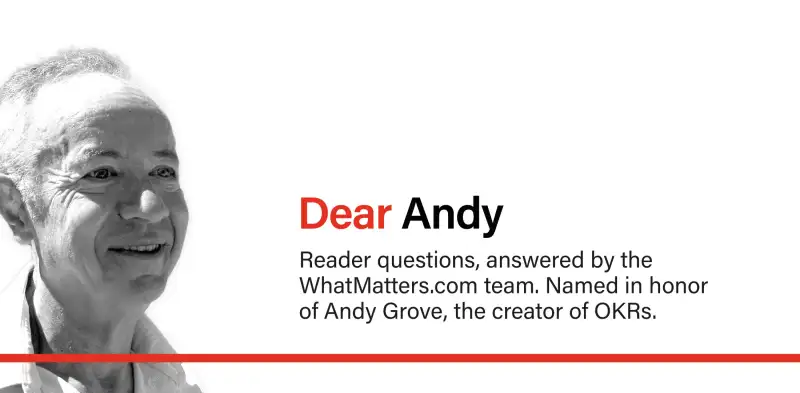Dear Andy,
How do OKRs apply to project execution in stable environments such as automotive projects? My team’s success is evaluated on the ability to deliver a product that meets well-defined requirements within a well-defined timeframe. My OKRs inevitably end up replicating the project plan, hence adding very little value. Are OKRs useful in this scenario? Thanks!
Sincerely,
Andrea

Hi Andrea!
Thanks for writing in and for your great question. Your example highlights one of What Matters’ biggest selling points: KRs should not end up looking like a project plan.
One of the key factors of OKRs is that they look to the future and ask “what’s next?” They are the opposite of ‘business as usual (BAU),’ and should challenge your team to move the needle forward in an ambitious, but realistic fashion. OKRs are for teams whose work won’t stay static and they help when teams get stuck in a rut. In short, OKRs change or significantly improve the way work is done.
You’re correct in thinking that ‘project plan OKRS’ add little value. I always like to remind teams not to forget that the “R” in OKRs stands for “Results.” One issue that comes up a lot when OKRs look like project plans is that the team’s sole responsibility becomes getting things done. So they may launch X on time — but did launching solve anything for the business? How does the work contribute to a win?
For example, did launching a new branch of stores in a new region result in beating a competitor? The project plan (the work) becomes the steps to launch the stores on time, the OKR is how you know you’re selling more than a competitor in the region. Said another way, launching on time is the project plan, communicating and holding teams responsible for the desired outcome is the OKR.
OKRs work best when they empower teams. Deliverables are important, of course, but you’ll find your team produces much stronger deliverables if they know how their work connects to the company’s mission. The more clearly they inspire rich dialog about the goal (not only the deliverable), the more you can trust teams to make the right decisions. Less check-ins/top-down control needed.
So… how do these automotive projects fit into the broader company strategy? What will delivering these products accomplish, and how will they move the needle forward? Once you’ve answered those questions, you’ve got the building blocks for some solid OKRs.
Thanks for writing in, Andrea, and best of luck to you on your OKR journey.
Sincerely,
Billy from the What Matters Team

